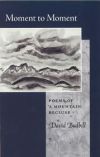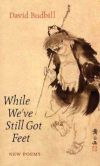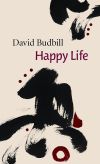


David
Budbill's American hermit poems
In three books of poetry published by Copper Canyon Press, Moment to Moment: Poems of a Mountain Recluse (1999), While We've Still Got Feet: New Poems (2005), and Happy Life (2011), contemporary American poet David Budbill aims to recreate the mentality of ancient Chinese poets and recluses through the prism of a modern American observer -- or, perhaps, the other way around. Whereas gendai haiku is a modern and intentionally distinct version of traditional Japanese haiku, Budbill creates his own gendai genre of Chinese and American poetry, a mix of ancient perceptions and modern sensibilities.
To parallelCold Mountain -- the 9th-century Chinese hermit and poet Han Shan -- Budbill presents himself as Judevine Mountain, living in a rural setting (his own northern Vermont), experiencing the paradoxes of ancient and modern life. It is Budbill's own life, thought, and feelings revealed. Appreciation for tranquility, reflection, and melancholy are often broken by distinctly modern expressions of peevishness, sarcasm, depression, and bouts of worldly temptation.
To appreciate the poems, an acquaintance with the classics such as Han Shan, Tao Chien, Tu Fu, and Po-Chu-i helps, as does acquaintance with Beat poetry, and jazz and spoken poetry. The latter are influences on Budbill's style that reveal the lingering lure of an alternative to his life of remoteness, an urbane and busy lure.
The first book, Moment to Moment, follows a bell curve from scene-setting to daily life and affirmation, to resignation. An opening poem sets the tone.
Thirty years in one place.
Thirty vegetable gardens in the same soil.
Thirty woodsheds filled and emptied,
Thirty years through the woods and mountains
on the same trails.
This is an age of frantic travel and people think
I am a fool for never going anywhere.
It's okay, I don't care.
In another time I would have been a sage
for doing what I haven't done.
Budbill speaks of "Chinese melancholy" and "sweet Zen emptiness," of idleness, the enjoyment of woodland romps, wildflowers and birds, and of being indoors in winter with a fire, tea, and books of the ancients. Moment to Moment conveys a spontaneity, wonder, and simplicity deftly combining ancient and modern.
With While We've Still Got Feet, Budbill extends the persona of hermit poet, even offering a concordance of the poems that are inspired by specific poems of Han Shan. But modernity creeps in more nakedly through uneasy political poems, in moods more melancholic, more nostalgic, more regretful, occasionally bitter. Loneliness, old age, and death loom over the solitary. What good is enlightenment without your family and friends? the poet asks. What's so great about fleeing the world?
So let's now sing praises to
Ambition and Lust
These proofs we are alive.
The oscillations are genuine enough given Budbill's alter ego love of the New York City of his memory and daydreams: the crowds, ethnicities, food, music, noise, excitement. Like the Beat poets of his generation, Budbill performs here and there with his Judevine Trio, reading poems to jazz before live audiences in informal settings.
I love both
the silence of the mountains
and the cacophony of the city,
Sounds and silence.
Crowds and emptiness.
Yang and yin.
Purists will prefer the stoicism of Moment to Moment; While We've Still Got Feet is more epicurean, with the signature last poem (from which the title is derived) a call to seize the moment. (See this You-tube performance.) Trying to balance an eremitic sensibility between simple-mindedness and a too-informed complexity is perhaps the core of the modern solitary's art. Budbill takes on the challenge with a fearless heart.
ADDENDA 2012.
With the collection titled Happy Life, has the poet completed a trilogy? If the philosophy of life of the previous poems oscillates between Stoic and Epicurean, Happy Life is a reconciliation, a resolution, a turning of the wheel that encounters the Greek eudaimonia as much as the Chinese poet Po-Chu-i's "happy-go-lucky" style.
The familiar themes are here, refreshed and original The collection is generous in seasonal color and celebration: flowers, harvests, grand tables, fresh food, hard work, clear sky, mists, autumn coolness, and occasions for gratitude. The poet calls himself a "fake hermit," not so much because of his family and friends, but perhaps because of his confessed thoughts, which, excised from the book, would seem to him more rather than less fake. (Remember the hermit elder and the novice? The novice confesses that he has been in the desert 60 days and still has impure thoughts. The elder looks at him and replies, "I have been in the desert for 60 years and still suffer them." But here the poet embraces them, a little too eagerly.)
But the poet grows old, and admits it, philosophically. He is healthy enough to pursue the credentialing routines of self-sufficiency outdoors, and the integrative routines of books, food, and tea indoors. Solitude is the privelege of insight.
I've been here forty years.
I'd like to be here forty more.
The longer I'm here the less
I want to go away, the less
I want to be known. I'd like to
disappear into these mountains,
and never be seen again. I just
want to do my work, make my
poems, and be left alone.
I want to stay here to the end.
And the poem from which the book takes its title, inspired by Yang Wan-li, is roundly satisfying to the trilogy (if trilogy it be); the concluding stanza:
I've led a happy life
doing what I want to do.
How could I be so lucky?
Ad multos annos, David Budbill.
¶
